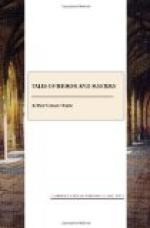On the discovery of the tragedy an examination was instantly made of the tickets of all passengers, and the number of the passengers themselves was counted. It was found that only three tickets were unaccounted for, corresponding to the three travellers who were missing. The express was then allowed to proceed, but a new guard was sent with it, and John Palmer was detained as a witness at Rugby. The carriage which included the two compartments in question was uncoupled and side-tracked. Then, on the arrival of Inspector Vane, of Scotland Yard, and of Mr. Henderson, a detective in the service of the railway company, an exhaustive inquiry was made into all the circumstances.
That crime had been committed was certain. The bullet, which appeared to have come from a small pistol or revolver, had been fired from some little distance, as there was no scorching of the clothes. No weapon was found in the compartment (which finally disposed of the theory of suicide), nor was there any sign of the brown leather bag which the guard had seen in the hand of the tall gentleman. A lady’s parasol was found upon the rack, but no other trace was to be seen of the travellers in either of the sections. Apart from the crime, the question of how or why three passengers (one of them a lady) could get out of the train, and one other get in during the unbroken run between Willesden and Rugby, was one which excited the utmost curiosity among the general public, and gave rise to much speculation in the London Press.
John Palmer, the guard was able at the inquest to give some evidence which threw a little light upon the matter. There was a spot between Tring and Cheddington, according to his statement, where, on account of some repairs to the line, the train had for a few minutes slowed down to a pace not exceeding eight or ten miles an hour. At that place it might be possible for a man, or even for an exceptionally active woman, to have left the train without serious injury. It was true that a gang of platelayers was there, and that they had seen nothing, but it was their custom to stand in the middle between the metals, and the open carriage door was upon the far side, so that it was conceivable that someone might have alighted unseen, as the darkness would by that time be drawing in. A steep embankment would instantly screen anyone who sprang out from the observation of the navvies.
The guard also deposed that there was a good deal of movement upon the platform at Willesden Junction, and that though it was certain that no one had either joined or left the train there, it was still quite possible that some of the passengers might have changed unseen from one compartment to another. It was by no means uncommon for a gentleman to finish his cigar in a smoking carriage and then to change to a clearer atmosphere. Supposing that the man with the black beard had done so at Willesden (and the half-smoked cigar upon the floor seemed to favour the supposition), he would naturally go into the nearest section, which would bring him into the company of the two other actors in this drama. Thus the first stage of the affair might be surmised without any great breach of probability. But what the second stage had been, or how the final one had been arrived at, neither the guard nor the experienced detective officers could suggest.




